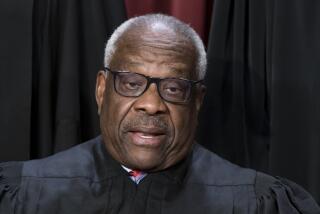Anita Hill Urges Women Judges to Push for Change : Equality: Law professor tells a meeting of justices in San Diego that they must work to abolish sexual stereotypes in courtroom.
A year after her testimony to the Senate riveted national attention on sexual harassment, Anita Hill on Friday urged women judges meeting in San Diego to abolish sexual stereotypes from the courtroom.
Stereotypes of women pervade U.S. courts and often block justice for victims of sexual harassment, domestic violence and date rape, she said.
“Much of society’s reaction to these problems is based on myths and stereotypes about women,” said Hill, a law professor who became famous with her testimony that then-U.S. Supreme Court nominee Clarence Thomas had sexually harassed her.
“If necessary, we’ve got to bring some of your colleagues into the 21st Century kicking and screaming,” Hill told about 1,100 judges and attorneys, most of them female, at a fund-raiser for the Women Judges’ Fund for Justice.
Courts tend to see the world from the viewpoint of men, not women, Hill said.
Admission of evidence and jurors’ thinking are still swayed by outdated ideas such as the presumption that women are harassed or raped because of the way they dress, she said.
For example, many judges won’t allow evidence about “rape trauma,” which might explain to jurors why a woman waited a month to report to police that she had been assaulted, she said.
Many courts still fail to admit evidence about the “battered woman syndrome” that might tell why an abused wife didn’t leave her husband, she said.
As progress, Hill noted the 9th Circuit Court’s ruling that the standards of a “reasonable woman” should be applied to determine whether sexual harassment creates a hostile environment in a work place. The standard acknowledges that women and men experience sexual harassment differently, she said.
Society and law have long condoned sexual harassment to persuade women that their place was in the home, she said, and the influence of that thinking remains.
Courts continue to trivialize women’s problems and blame the victims, she said.
Hill cited her own experience testifying before the all-male Senate Judiciary Committee a year ago Sunday.
During confirmation hearings for Thomas, Hill testified that he had sexually harassed her while she worked for him as a legal assistant in the early 1980s.
Thomas denied the allegations, and the Senate narrowly confirmed him to the Supreme Court.
“One of the things that became quite evident last year during the hearings was that the Senate did not grasp the seriousness of sexual harassment and the pervasiveness of it,” Hill said. “And unfortunately, it was because of a lack of perspective.”
More to Read
Get the L.A. Times Politics newsletter
Deeply reported insights into legislation, politics and policy from Sacramento, Washington and beyond. In your inbox three times per week.
You may occasionally receive promotional content from the Los Angeles Times.










